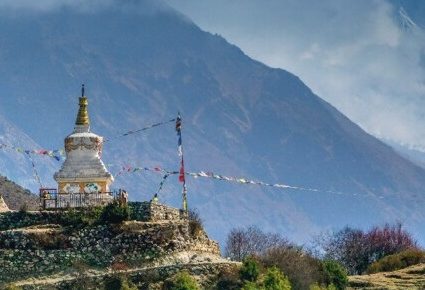
How do Western persons who believe in the reality of the individual self make sense of the Buddhist idea of no-self? How have experiences of travel in Buddhist cultures helped them to do this? How have writers described the ways in which such a journey changed them? These are my guiding questions in Journeys of Transformation: Searching for No-Self in Western Buddhist Travel Narratives.
Since the 1970s, dozens of autobiographical stories have described treks in Tibet, periods of residence in a Zen monastery, pilgrimages to Buddhist sites and teachers, and other Asian journeys. The best known of these works is Peter Matthiessen’s The Snow Leopard, and more than thirty other writers have written of their journeys, including John Blofeld, Jan Van de Wetering, Thomas Merton, Oliver Statler, Robert Thurman, Gretel Ehrlich, and Bill Porter. This genre of spiritual memoir describes how Asian travels brought a new understanding of Buddhism and transformed the author’s life.
Western Buddhist travel narratives often explore the Buddhist idea of no-self or not-self (in Sanskrit: anatman; in Pali: anatta), a puzzling concept that apparently denies a foundational assumption of Western culture: the reality of the individual personality or self. In Journeys of Transformation, I interpret how writers understand the Buddhist idea that the self is an illusion. The concept of no-self helps them interpret certain pivotal experiences of “unselfing,” and it is also a catalyst that provokes and enables such events. These incidents dislodge the ordinary and conventional sense of self and elicit another kind of awareness that feels extraordinary, significant, and invigorating, and that writers often link to a transformation of identity. The writers’ search for experiences that they hope will confirm the truths of Buddhism and their focus on incidents of unselfing “off the meditation cushion” during their travels reveal a new understanding of Buddhism as compared with traditional Asian forms. As well as personal change, these travel narratives depict the transformation—the identity-in-difference—of Buddhism as it is reinterpreted in Western cultural settings. Journeys of Transformation explores the geographical journeys and religious changes of both individuals and Buddhism itself.
I explore the meaning of a rather abstract and puzzling concept, the idea of no-self, with close literary analysis of autobiographical narratives, focusing on how Western writers use it to interpret their own experiences. Journeys of Transformation examines a fascinating group of books that have not been discussed together, maps the development of a literary genre, and compares the different ways in which authors portray the central Buddhist concept of no-self and the events that helped them understand it. Autobiographical narratives illuminate certain aspects of Buddhism and religious experience that are obscured or neglected by more abstract, theoretical, or systematic forms of discourse. I offer a fresh perspective on religious transformation, the study of which has been dominated by studies of Christian conversion and by social scientific approaches. The book explores how and why travel can be a crucial catalyst and context for religious experience and change.
Transformation is the central theme of the genre of spiritual autobiography and the deepest religious concern at work in Buddhist thinking about no-self. Journeys of Transformation offers crucial insights and wisdom about the meaning of no-self, the process of self-transformation, the religious significance of travel, and the evolving forms of modern Western Buddhism.
Latest Comments
Have your say!